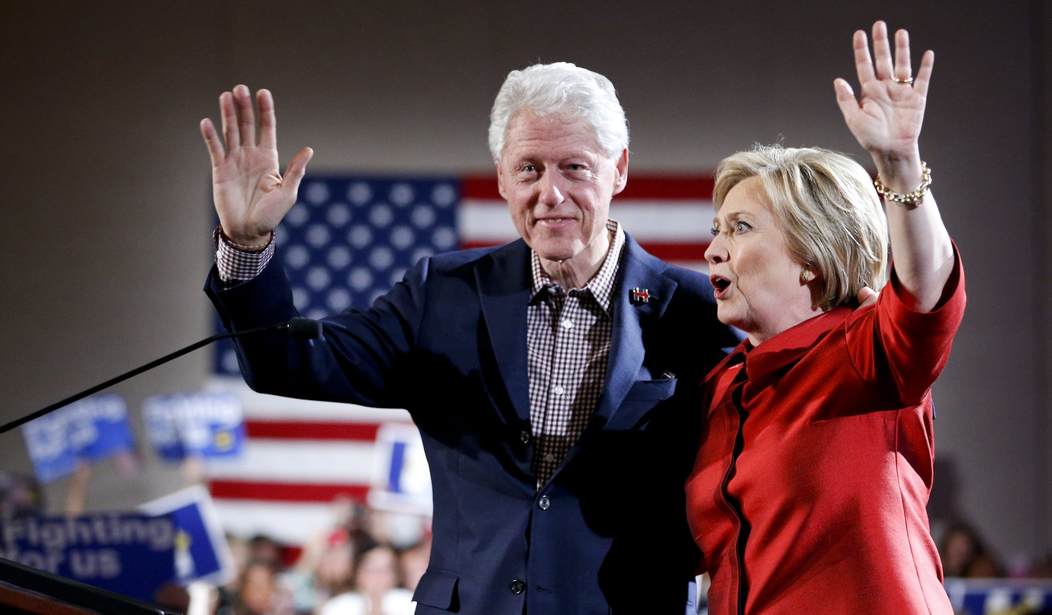The year 2016 was horrible in many ways, but one thing it did (or seems to have done — with these vampires, you never know) is finally rid America of the Clintons, who have been feasting off our body politic since 1992, when Bubba emerged from gangland-ridden Hot Springs, Ark., to snatch the Democrat presidential nomination away from Jerry Brown, Paul Tsongas and others, and thus begin a prolonged crime wave that finally ended on Nov. 8, when his talentless and uncharming hausfrau went down to a well-deserved defeat in a presidential election she never should have been involved in.
Hillary’s defeat broke the hearts and minds of the Baby Boomers of the media, who had devoted their careers to extolling the Clintons and aiding and abetting them at every opportunity until — in a break with protocol that no doubt will rankle Bill and Hill for the rest of their lives — they abandoned Ms. Rodham to throw themselves at the feet of Barack Hussein Obama. In so doing, the media made a fatal mistake, as the plan all along had been for Hillary to win in 2008 and 2012, leaving the field open for the much younger Barry Soetoro to complete the progressive revolution in ’16 and ’20, after which Amerikkka would be unrecognizable,
September 1963, two months before his death, John F. Kennedy mused aloud to his old friend the journalist Charles Bartlett about the prospects for the 1968 presidential election, in which, he presciently worried, his brother Robert might run against Lyndon Johnson.
“He gave me the feeling he wasn’t pleased,” Bartlett would recall years later. “He wanted a record of his own. I sensed that he wanted the Kennedy administration to be Jack, and Bobby was going to turn it into a succession thing. Jack didn’t want a dynasty, although I am sure his father would have wanted that.”
By all accounts, Bill and Hillary Clinton never had any such qualms, and now their quarter-century project to build a mutual buy-one, get-one-free Clinton dynasty has ended in her defeat, and their joint departure from the center of the national political stage they had hoped to occupy for another eight years. Their exit amounts to a finale not just for themselves, but for Clintonism as a working political ideology and electoral strategy.
The notion of Hillary Rodham Clinton as a plausible president, of course, never made any sense. For one thing, America is not a hereditary monarchy, and the prospect of a Bush-Clinton-Bush-Clinton presidential sequence was abhorrent to most Real Americans. For another, she had none of Slick Willie’s greasy charm, transparently phony as it was. Worst of all (and unlike him) she was a terrible liar; throw in her repellent personality and presto! you had the one candidate who absolutely could not have beaten Donald Trump in a national election.
By 2016, spurred by anger at Wall Street, and at Washington gridlock and business as usual, the Democratic Party had moved well to the left of the one Bill Clinton had inherited in 1992. And while Hillary Clinton recognized the change intellectually, she seemed unable to catch up to the practical realities of its political implications for her campaign. She embraced bold approaches on hot-button issues like immigration and gun control that would have been shocking for a Democrat in her husband’s day, and accepted what was arguably the most liberal Democratic Party platform in history, but that never seemed to be enough to satisfy younger voters, especially. “People thought she’d been conceived in Goldman Sachs’ trading desk,” says one veteran Clinton aide, noting the irony that this was millennial voters’ jaded view of a woman often seen in the 1990s as reflexively more liberal than her husband.
Clinton was trapped, too, by her service as Obama’s secretary of state and her need to appeal to his winning coalition. She could not, or would not, say aloud what others in her party knew: That Obama had not only largely overlooked the concerns of white working-class voters but, with his health care overhaul, had been seen as punishing them financially to provide new benefits to the poorest Americans. Fairly or not, he lost the public argument.
The other truth is that a huge part of Clintonism was always Bill Clinton himself, and his singular ability to speak to both the most elite audiences and the most everyday ones in ways that could move each, with a unique combination of the Ozarks and Oxford that has rarely if ever been seen in contemporary American politics. Hillary Clinton’s best efforts to retail a retooled version of Clintonism in 2008 crumbled in the face of Obama’s promise of hope and change.
As Bismarck probably never actually said (why would he have?), but which sentiment thankfully remains true: God looks after fools, drunks and the United States of America. In the Clintons’ case, one out of three ain’t bad.









Join the conversation as a VIP Member